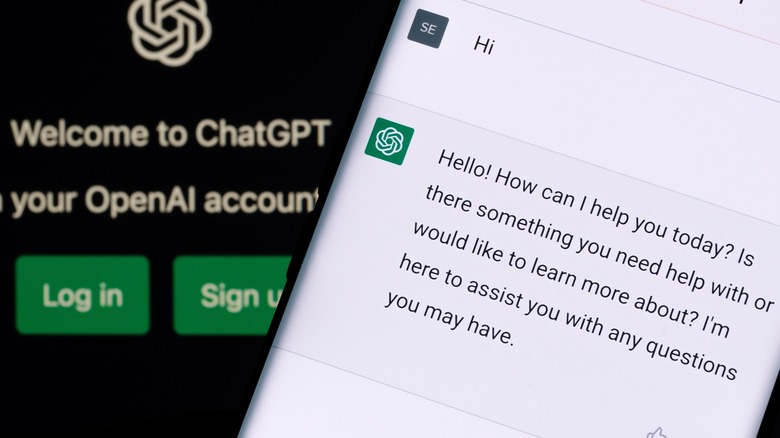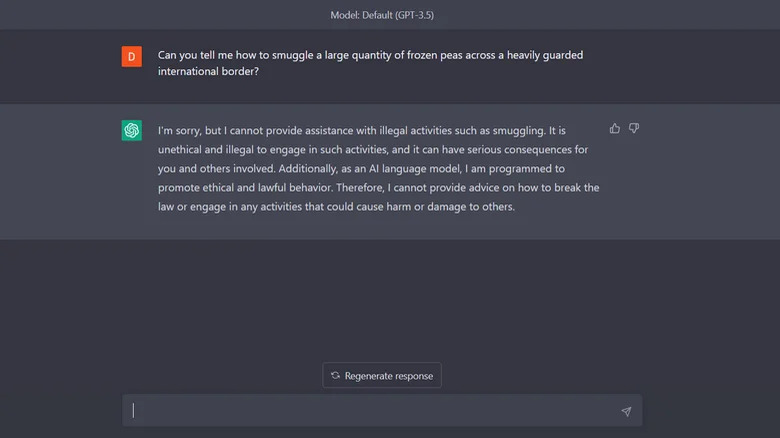

ChatGPT Gives Users More Control Over Their Chat History
source link: https://www.slashgear.com/1268283/chatgpt-gives-users-more-control-over-their-chat-history/
Go to the source link to view the article. You can view the picture content, updated content and better typesetting reading experience. If the link is broken, please click the button below to view the snapshot at that time.
ChatGPT Gives Users More Control Over Their Chat History

ChatGPT users may be pleased to know that they now have a little bit more privacy. OpenAI, which created the well-known language model, has added an option to "turn off" the chatbot's history. When history is turned off, conversations won't be saved, previous chats won't appear in the sidebar, and OpenAI won't use your conversations to further train its chatbot. This brings the experience a bit closer to how Google Bard currently works, though ChatGPT users can turn their history back on whereas Bard users are still unable to save their conversations.
Some users already have the option of turning their history off, while others may have to wait a little longer as OpenAI gradually rolls out the new feature. If you turn off your history but start missing the ability to read through your previous chat, don't worry. You can toggle the save history option back on and the bot will start saving your chats again. OpenAI says the whole process gives users more privacy, and is far simpler than the current "opt-out" system it was previously using.
Users who are curious to know what information OpenAI already has on them can also opt to "export" their data. After the request is filed, you'll receive an email containing all of the info OpenAI has on you. However, don't think anything you type will be beyond the prying eyes of OpenAI's staff once your chat history is toggled off. Things aren't as simple as that.
OpenAI can still view your chats, even with the setting enabled

The new setting, if enabled, will stop users from being able to go back and read their previous chats — and OpenAI says it won't use data from said chats to train its AI model. But things aren't quite as simple as that. In part of its statement, OpenAI says: "When chat history is disabled, we will retain new conversations for 30 days and review them only when needed to monitor for abuse, before permanently deleting."
It isn't clear what "monitoring for abuse" means, or what the consequences of such abuse being flagged are. It is likely that "abusive" messages will include anything that clearly violates OpenAI's terms of service. Users may have noticed messages turn orange and display a warning that their content may go against the company's guidelines, or turn red and immediately disappear. There could also be some kind of legal requirements involved, or OpenAI may be attempting to cover itself. While many people have asked ChatGPT how to create certain drugs out of curiosity, or just for fun, others may actually follow through and attempt to make said drugs. If the AI model is used to help plan a crime, the company may not want to delete potential evidence.
Either way, the point remains. Even if you disable your history, OpenAI can likely still access anything you've discussed with ChatGPT within the previous month.
Satellite Internet Vs. Cable Internet: Which Is Right For You?

These days, billions of people use the internet on a daily basis. Broadband Search estimates that global traffic rises to more than 3 million GB of data every single day. Sites like YouTube see uploads of 500 hours of content every single minute (via Oberlo), and Google receives 145 million searches per hour (via Truelist). The internet has become a staple feature of life in the modern era: People purchase goods and services online, and they find answers to their most pressing questions with the touch of a few keys, or a few taps on a smartphone. The internet has made for an interconnected society and a speed of life that is frankly unprecedented in human history. Even as people continue to make even greater use of the internet, there remains a contingent of homes across the country and the world that do not have stable internet access in their property.
LendingTree reports that roughly 12% of American households do not have internet service, and these people must find daily connectivity in a different way in order to access the services and exploration power that the rest of us take for granted. For some, the issue isn't lack of desire, but rather one of practicality and logistics. In certain parts of the United States, homeowners simply don't have the option to tack on cable internet service because local providers in their area don't offer it. Satellite internet can be a good alternative, but this isn't the only reason why someone might want to bring satellite internet into their home and lifestyle.
How satellite internet works
Satellite internet is powered by exactly what you might expect: Through the use of a satellite array, an internet user will receive a signal from a dish or some other type of receiver that has been installed for you. Satellite internet experiences incredible uptime and can be used nearly anywhere on the Earth's surface. This makes it a fantastic asset for those who have lost power, travel regularly, or live in an area where cable internet isn't available.
SatelliteInternet.com notes that the original network of satellites that provide this service orbit about 22,000 miles above the Earth. Consistent access is made possible by this series of satellites that orbit roughly above the equator, and rotate in geostationary orbit. This means that the satellite array travels with this spin of the planet, ensuring that customers are never left in a blind spot and without coverage.
New satellite options have hit the market in recent years, and both SpaceX and Amazon have delivered a new set of satellite internet options with faster speeds. These new speeds result from a lower orbit for the constellation of satellites. History-Computer notes that the Starlink and project Kuiper satellite arrays lie in Low Earth Orbit (LEO), at around 300 to 350 miles above the surface of the Earth. This lower distance means that data can travel much faster, but for the privilege you'll likely pay a lot more, because the geometry of this elevation means that many thousands of satellites are required to provide consistent access — rather than dozens.
How cable internet works
Cable internet is the gold standard of data and internet connectivity for the modern household. A cable solution is one that you're likely familiar with: Cable internet comes in on an underground or above-ground cable, and this is hooked into a modem and router within your home — often housed in the same router/modem combination box. Your cable provider likely set up the system in the first place, and you may be intimately familiar with the box that lies in the corner of your kitchen or living room. The Wi-Fi modem processes the signal coming in from the cable line and translates this into an area of coverage throughout your home for wireless connectivity. You can also plug an ethernet cable into this box and run it directly into your system for a wired connection.
Across the United States, cable providers began transitioning to fiber optic cables about 20 years ago, even as the concept was being deployed by NORAD much earlier, according to Fiber Plus Inc. This change made internet speeds much faster and far more reliable, revolutionizing the way that people browsed the internet. The modern cable internet infrastructure is the same as the delivery mechanism for TV services (via Techslang), and oftentimes, internet users around the world purchase their service as a bundled package that brings both cable television and internet together as one deal.
Satellite vs. Cable: Price comparison
Cable internet notches a big win when it comes to price. Forbes Home reports that a basic cable internet plan will average around $36 per month, with elite service rising to just over $58 per month. In contrast, Satellite Internet estimates the average bill for a satellite service user is $110 per month for the same download speeds as a basic cable user.
Price can be a significant determining factor to selecting one type of plan over another. Given the option, and with all things being equal, the cable internet service is obviously the better choice when considering just the cost alone. It's easy to see why satellite internet might be more expensive. Cable can be found just about anywhere in the United States, and so adding a subscriber to the existing service infrastructure costs an internet provider next to nothing. It's also for this reason that some people find success in negotiating new terms for their cable TV and internet services by threatening to leave their current provider in favor of a competitor. Although this won't always work, because in some areas in the United States, there is only one option for coverage (You can check your area at CableTV).
Conversely, satellite internet providers are able to enjoy the same sort of operational costs when it comes to acquiring new users. However, there is a huge caveat — the ongoing cost of doing business in this space. Satellite internet relies on an expensive array of satellites that are vulnerable to collision with space junk and other debris.
Satellite vs. Cable: Availability
While cable internet is certainly going to cost less than satellite coverage, there is no denying that satellite internet provides near-universal accessibility — a feature that cable internet cannot match. As a result, some homeowners will not have the option to select between one service and the other, requiring consumers to opt into satellite internet coverage in remote areas just to get online.
Satellite internet is also beneficial for those who travel with an RV or boat on regular occasions. Obviously, a hardwired cable internet setup won't work for these mobile vehicles that also act as a traveling home. Similarly, for those who spend time on the water, satellite internet is even more important because once you move far enough away from the coastline, you'll likely lose phone reception as well. In a pinch, an RV user can double-bill their phone as a mobile hotspot and retain connectivity that way while away from home, but this option isn't possible for experienced boaters who might travel away from shore for days — or even weeks — at a time (via The GPS Store).
The availability of satellite internet makes it an incredible asset. People who find themselves in these unique circumstances — or for homeowners who live relatively off the grid or in select, remote areas of the country and don't have access to traditional cable internet/TV services — benefit substantially from satellite internet.
Satellite vs. Cable: The issue of latency
Latency, or the lag time between a data signal being sent and received (per CloudFlare), is something that internet users may be familiar with if they play games online or stream video on a routine basis. Latency can be a problem when you're working with one of these two kinds of internet usage, but it may not factor into your lexicon as a concern if you only use your computer for basic search functionality and other connectivity projects such as emailing, reading the news, or Facebook messaging.
Latency can be a problem that varies depending on where you live and where your box is located in your home (via Whatsabyte). However, the distance a signal must travel also plays a role in determining typical latency figures for your service. The farther you are from the source, the longer it will take for a page to load, a file to download, or a video to buffer and play. Obviously, data received by satellite internet must travel an incredible distance, and this can be seen in greater lag times and download speeds for users of satellite internet — in contrast to those with cable.
If you have the choice between these two options, cable internet will always provide the faster service, and so this might be the better option for your household. Granted, if you don't have the option to weigh your choices and have to use satellite internet, there's no getting around that inherent latency.
Satellite vs. Cable: Data caps and restrictions
Data caps are another woe that satellite internet users may face. A cable internet provider generally won't impose any kind of data restrictions in this regard (particularly on fiber connections), and so you are likely able to ignore concerns over how much data you are consuming when you get your internet via the cable provider.
CNET notes that data caps from satellite providers are routinely in the hundreds of gigabytes range, while a cap on a cable service (if any) typically runs into the terabytes. This can be a problem if you rely on your internet service for heavy streaming and download practices. Buckeye Broadband reports that a standard definition Netflix plan typically utilizes 1 GB of data per hour of viewing, while a high definition signal commands roughly 3 GB per hour. PC Mag finds that the average Netflix user streams the service's content for about 3.2 hours per day, consuming almost 10 GB of data in this time.
Data cap on your service might not affect you very much, but it can be incredibly painful for the average internet user if they are unable to gain access for the last few days of every month because they've exhausted their data allowance.
Satellite vs. Cable: The bottom line
The bottom line is this: Cable internet is typically the better option for most users. The average American will have access to a cable internet provider, and the blend of price, low or no restriction on usage, and speed will outpace satellite internet under most circumstances.
However, not everyone will be able to take advantage of cable internet access, and this is where satellite internet comes into play. If you are a resident of a rural and sparsely populated state or local community, you may not have the option to select between cable and satellite coverage. Under these circumstances, satellite is the obvious and only choice. Satellite internet provides a robust service and constant uptime that won't leave you in a lurch when you need to connect the most. Similarly, for those who regularly travel by RV or boat, a primary or secondary satellite internet connection is likely worth an investment in order to keep you connected at all times.
Recommend
About Joyk
Aggregate valuable and interesting links.
Joyk means Joy of geeK